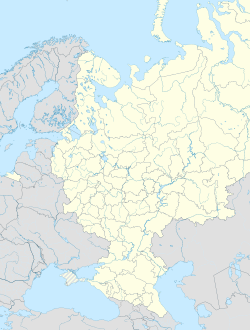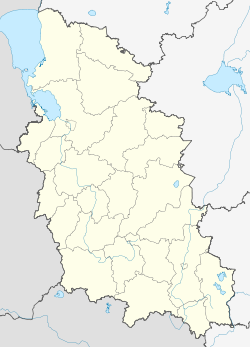Pytalowo
| city
pytalovo
Пыталово
|
||||||||||||||||||||||||||||||||||||||||
|
||||||||||||||||||||||||||||||||||||||||
|
||||||||||||||||||||||||||||||||||||||||
| List of cities in Russia | ||||||||||||||||||||||||||||||||||||||||
Pytalowo ( Russian Пыталово , 1925 to 1938 Jaunlatgale , 1938 to 1945 Abrene ) is a small town with 5826 inhabitants (as of October 14, 2010) in the Russian Federation . It belongs to the Pskov Oblast and is located in the far west of Russia not far from the border with Latvia around 100 km southwest of the regional capital Pskov .
history
The place was first mentioned as Pytalowo in 1782, when 13 farmers lived there. The village of Pytalowo had 57 inhabitants around 1878. It belonged to the Ujesd Ostrow of the Gubernija Pskow.
In the 1850s, the construction of the Saint Petersburg - Warsaw railway line began and the stations along the line were built. The closest stretch from Ostrow to Rēzekne was quite long for the time. It was decided to build so-called "half stations" ( breakpoints ). After a railway stop was built in the immediate vicinity of the estate, it was called Pytalowo. This was the time when the city of Pytalowo was founded. From 1881 the breakpoint was run as an ordinary train station. During the First and Second World War , the station was extensively expanded and repeatedly taken by both the German and Russian sides.
Due to the Latvian-Soviet peace treaty of 1920, part of the Ujesd Ostrow with Pytalowo went to Latvia , the city was renamed Jaunlatgale (German: New Latgale ) in 1925 , before it was named Abrene in 1938 . It refers to the historical landscape of Adzele , Old High German land tho Adsel , which includes a northern part of Latgale .
After the Second World War, the Soviet Union incorporated Abrene and part of the district into the Pskov Oblast of the RSFSR . Most of the residents of Latvian descent were evicted and the town was renamed Pytalowo.
With independence restored in 1991, Latvia tried to get the city back, but failed due to international pressure. Allegedly a referendum is said to have been carried out, the majority of which spoke in favor of belonging to Russia. After the conclusion of a border treaty with Russia on March 27, 2007, Latvia also formally waived its claims in relation to the approximately 1,400 square kilometers area around Pytalowo.
Population development
| year | Residents |
|---|---|
| 1959 | 3519 |
| 1970 | 4135 |
| 1979 | 5409 |
| 1989 | 7166 |
| 2002 | 6806 |
| 2010 | 5826 |
Note: census data
coat of arms
Description: From the green, enlarged head of the shield , a pewter cut divides the heraldic shield , split into gold and red . Above a black roofed silver church and in front a black horseshoe at the gap. At the back a golden key is placed on a stake at the gap with a quatrefoil and the beard pointing upwards and to the left has a Pauliner cross cutout.
Place name
There are several derivations for the place name "Pytalowo", none of which have been confirmed by archive material so far:
- Place of torment (of torture)
- The Russian verb пытать ( pytat ) or the associated noun пытки ( Pytki ) means in German: “torment”, “torture” or “torment”, “torture”. The name Pytalowo corresponds accordingly to the "place of torment" or the "place of torture". This could be due to the symbolic “place of torment”, a large iron cross on a mountain in the direction of the city of Ostrow, which is said to have existed in Pytalowo. Another variant alludes to the remoteness and desolation of the place as a “place of torment”.
- Pytalov's estate
- Legend has it that Catherine the Great left the land to a guard officer named Pytalow, after whom the place is said to have been named.
- Location near Tolowa
- The region "Tolowa" ( Lat . Tālava ) already existed in the 13th century , which was settled by Baltic tribes at an early stage and later came under German rule and then alternately under Swedish, Lithuanian, Polish, German and Russian rule. The region owed tribute to the city of Pskov . The place near Tolowa (Lat. Pie Tālavas ) could have got its name from the onomatopoeic adoption of the Latvian name “pie Tālavas” into Russian as “Pytalowo”.
Individual evidence
- ↑ a b Itogi Vserossijskoj perepisi naselenija 2010 goda. Tom 1. Čislennostʹ i razmeščenie naselenija (Results of the All-Russian Census 2010. Volume 1. Number and distribution of the population). Tables 5 , pp. 12-209; 11 , pp. 312–979 (download from the website of the Federal Service for State Statistics of the Russian Federation)
- ↑ http://www.tagesspiegel.de/politik/international/lettland-russland- Grenzvertrag; art123,1881225
References
- Website of the city of Pytalovo (Russian)
- Pytalowo on mojgorod.ru (Russian)



